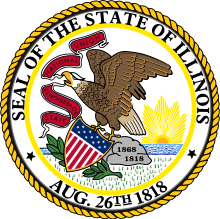Samuel D. Lockwood
| Samuel D. Lockwood | |
|---|---|
 | |
| 3rd Illinois Attorney General | |
|
In office 1821–1822 | |
| Preceded by | William Mears |
| Succeeded by | James Turney |
| 2nd Secretary of State of Illinois | |
|
In office 1822–1823 | |
| Preceded by | Elias Kane |
| Succeeded by | David Blackwell |
| Illinois Supreme Court Justice | |
|
In office 1824–1848 | |
| Personal details | |
| Born |
August 2, 1789 Poundridge, New York |
| Died |
April 23, 1874 (aged 84) Batavia, Illinois |
| Political party | Whig |
| Other political affiliations | Republican Party |
| Spouse(s) | Mary Stith Nash |
| Children | Mary (1828–1877), Susan (1830–1864), Anna (1838–?) |
| Profession | Judge |
Samuel Drake Lockwood (August 2, 1789 – April 23, 1874) was an Illinois politician who served as the state's Attorney General, Secretary of State, and Supreme Court Justice.
Early life
Lockwood was born in Poundridge, New York. His father, Joseph, was an hotelier. His mother was Mary, née Drake. Samuel was the oldest of four. His siblings were Jesse (b.1791), Rebecca (b.1792), and Cornelius (b.1793). Cornelius died of yellow fever in 1799, and their father Joseph died two days later of the same disease.[1] The following year, Mary married Duncan McCall and moved to Canada with Rebecca, leaving Samuel and Jesse at a private school in New Jersey for a few months before being taken in by their uncle, Francis Drake.[2] Samuel studied law with Drake and was admitted to the bar in Batavia, New York in 1811.
Law career
Lockwood practiced law in Batavia for a year before relocating his practice to Sempronius, New York for about a year and a half. From 1815 until August 1818, he had a law partnership in Auburn, New York with George B. Throop. Lockwood ended that practice when he decided to move to the new state of Illinois.[1] In 1818, he and a friend, William H. Brown descended the Ohio River, disembarking at Shawneetown. They walked across the state to Kaskaskia and Lockwood eventually settled in Carmi. He finally settled in Batavia, Illinois, in 1853.[3]
Political career
In 1821, Lockwood was elected Attorney General. During his brief term as Attorney General, Lockwood successfully prosecuted the only known duel to come to trial in Illinois.[1] He resigned after only a year when Governor Edward Coles appointed him as Secretary of State when Illinois' first Secretary of State, Elias Kane, was elected to the Illinois House of Representatives.[1] Three months later, Lockwood received an appointment as the Receiver of Public Moneys from President James Monroe. One of the reasons Lockwood accepted the appointment from Madison was that it would afford him the time and money to ensure that Illinois would remain a free state.[1] Lockwood received an appointment to the First Board of Canal Commissioners. Lockwood was given the duty of contracting with engineers to survey the route of the Illinois and Michigan Canal. Also in 1824, The Illinois Supreme Court was reorganized by the legislature and Lockwood was appointed a judge on the Supreme Court and remained on the court until 1848.
In the 1820s, Lockwood resisted the adoption of a pro-slavery Constitution for Illinois, but he was one of the framers of Illinois' second Constitution, in 1848.[2]
Retirement and death
In his retirement, he remained in Batavia (Illinois), where he died at age 85.
References
- 1 2 3 4 5 Coffin, William (1889). Life and Times of Hon. Samuel D. Lockwood. Chicago, IL: Knight & Leonard Co. pp. 9, etc.
- 1 2 Bateman, Newton; Paul Selby; Frances M. Shonkwiler; Henry L Fowkes (1908). Historical Encyclopedia of Illinois. Chicago, IL: Munsell Publishing Company. pp. 341–2.
- ↑ John Gustafson Historic Batavia ISBN 9780923889067 p. 45
| Legal offices | ||
|---|---|---|
| Preceded by William Mears |
Illinois Attorney General 1821–1822 |
Succeeded by James Turney |
| Political offices | ||
| Preceded by Elias Kane |
Secretary of State of Illinois 1822–1823 |
Succeeded by David Blackwell |
